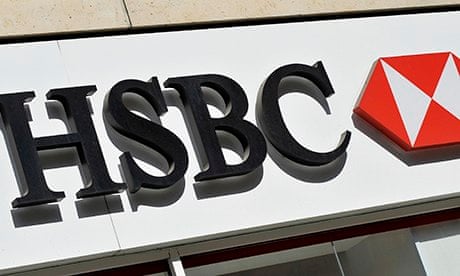HSBC has become the latest bank to admit it is co-operating with the global investigation into possible manipulation of the £3tn-a-day currency markets.
The admission came on Monday as the UK's biggest bank revealed it had more than doubled the number of staff dealing with legal and regulatory issues to 4,700.
Reporting a 30% rise in profits to $4.5bn (£2.8bn) in the third quarter, the bank also disclosed it was reviewing sales to 200,000 customers in the UK who bought wealth management products after 2008. It also said it needed to increase its provisions against possible regulatory action by US authorities over US residents with accounts at its Swiss banking operations.
Stuart Gulliver, HSBC's chief executive, said the bank had increased the number of staff working on regulatory issues from 2,000 at the start of 2011, hiring 1,600 more compliance staff since the end of December alone to bring the total to 4,700. Gulliver has set the bank on a track to cut costs, making $4.5bn of savings since 2011 – some of which has now been ploughed into expanding the bank's compliance functions.
HSBC's shares were the biggest risers in the FTSE 100 in early trading, gaining 2% to 700p even though there was some anxiety that the bank might miss its own targets for returns to shareholders. Its upbeat outlook statement – pointing to better growth in China and the UK – helped bolster sentiment.
Hit last year by a record £1.2bn fine for breaching money laundering laws in the US and allowing drug traffickers to move money around the financial system, HSBC has been forced to take a series of steps to increase its compliance and legal functions. Other banks have been doing the same – America's biggest bank, JP Morgan, has hired 3,000 compliance staff this year. In the third quarter, HSBC set aside an additional $514m for the cost of compensating customers mis-sold payment protection insurance and $132m for businesses mis-sold interest rate products.
Gulliver said a new investigation into the way its wealth management division had sold products had led to a $149m provision after the Financial Conduct Authority (FCA) conducted a mystery shopping exercise into its sales practices. The bank had to appoint Grant Thornton as a "skilled person" under the instruction of the regulators to review its sales practices and now expects to pay out up to $30m in compensation, the rest of the $149m being administrative costs.
Gulliver said the bank had not had to suspend anyone in connection with the investigation into the possible manipulation of a foreign exchange benchmark that has been under way around the globe for the past few weeks. The FCA is among a number of regulators known to be looking at the way a price for currencies is set during a 60-second trading window. The "names we've been given" no longer worked at the bank, Gulliver said.
HSBC is adding its name to the growing list of banks admitting to co-operation with the regulators, including Royal Bank of Scotland, Deutsche Bank, UBS, JP Morgan and Citigroup. Gulliver would not deviate from a statement issued by the bank. "The Financial Conduct Authority is conducting investigations alongside several other agencies in various countries into a number of firms, including HSBC, relating to trading on the foreign exchange market. We are co-operating with the investigations, which are at an early stage."
The bank said there was uncertainty about the amount of capital it might need to hold because of changes being discussed with regulators. Gulliver gave few clues as to how the bank would deal with the cap on bonuses being imposed by the EU after the bank had warned in the summer it was considering increasing salaries.
Gulliver was upbeat about the UK and Hong Kong, and appeared to express commitment to the UK, where the bank has been headquartered since taking over Midland Bank in the mid-1990s.
"Our home markets of the UK and Hong Kong contributed more than half of the group's underlying profit before tax. Hong Kong performed well in the quarter, reflecting broad-based revenue growth. Hong Kong continues to benefit from its close economic relationship with mainland China. We remain well positioned to capitalise on improving economic conditions in these markets," Gulliver said.
He was positive about China and also the UK, which he said "should see positive growth and outperform the eurozone". But he warned that economic growth in Latin America would remain slow, although the Mexican economy should strengthen in 2014.
The bank's forecasts for global growth remain constant at 2.0% in 2013 and 2.6% in 2014.
